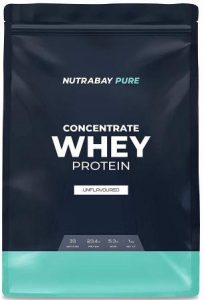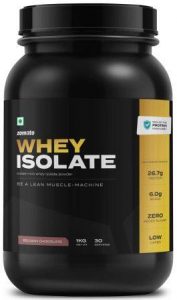Are you searching for simple ways to increase your daily intake of protein? Do you wish to build muscles fast? Is being skinny lowering your confidence every time? If yes, then whey protein can be the ultimate solution to your problem!
Whey protein powder is an amazing product which most bodybuilders and fitness enthusiasts swear by. It contains all of the essential amino acids that help in building and repairing muscles.
However, if you can’t decide if is good for you, then don’t worry! This article will provide you with everything you need to know about whey protein – what exactly it is, its types, benefits, dosage, and potential side effects.
So keep scrolling down!
What Is Whey Protein?

In simple words, whey protein is nothing but proteins obtained from whey. Whey is the liquid part of milk that separates during the cheese-making process.
Milk is composed of two main types of protein: casein, which accounts for approximately 80% of milk protein, and whey, which accounts for the remaining 20%.
More precisely, whey is present in the watery part of the milk. The fat components of the milk solidify during the cheesemaking process, and the whey is separated from the milk as a by-product.
For example, when you open a container of yogurt, you will notice water floating on top. This is what we call whey. Initially, cheesemakers used to discard it and it was only later that its market value was discovered.
Whey proteins contain all of the essential amino acids that help build and repair muscles because proteins are made up of amino acids. Consuming whey protein powder is an easy way to add more proteins to your daily diet.
Types Of Whey Protein
Now that you know what whey protein is, let us also inform you of its types. Depending on the way they are processed, whey proteins can be of the following types:
1. Whey Concentrate

Whey concentrate is the simplest form of whey protein. It is obtained when whey is neutralized and continuously filtered. As compared to other whey proteins, whey concentrate is lower (70-80%) in protein percentage and higher in carbohydrates and fats.
Note: The carbs in whey concentrate are usually lactose, so if you’re lactose intolerant, then it isn’t suitable for you.
2. Whey Isolate

When whey concentrate is further purified to eliminate the carbs and fats, the remaining product is known as whey isolate. It is relatively higher (90%-95%) in protein percentage and low in carbs and fats and calories.
Moreover, it is slightly more expensive than whey concentrate since it includes more proteins. Lactose intolerant individuals should choose whey isolate, which has little or no lactose.
3. Whey Hydrolysate

Last but not the least; a whey hydrolysate is a form of whey that has been processed to break down the bonds of the protein into amino acids.
These acids are easier to absorb by the body and help in muscle recovery. Whey hydrolysate tastes bitter taste since it is more exposed to acid or heat during processing. Also, it is the most expensive type of whey protein.
So if you work out to build muscle daily, whey hydrolysate can provide your muscles with more energy and help you to recover between workout sessions.
Health Benefits Of Whey Protein
Now that you know about the different types of whey protein powders, let’s dive into their amazing health benefits!
1. Helps In Building Muscles

Whey protein is very rich in the amino acid leucine. Leucine is effective at triggering the body to build new muscle and repair damaged muscle. It gets absorbed into your bloodstream faster than any other type of protein.
Thus, whey protein is capable of maximum stimulation of muscle protein synthesis.
2. Keeps You Fuller For Longer
If you want to control your hunger pangs, whey protein is the way to go! It is rich in proteins and low in calories. Therefore, if you consume more protein, you will be less hungry and thus likely to eat fewer calories.
3. Helps In Weight Loss

The science behind whey protein for weight loss is simple. Whey protein contains very few calories and consuming fewer calories helps in shedding those extra pounds off. Thus, adding it to your daily diet is a simple, safe, and effective way of losing weight.
4. Helps Reduce Blood Pressure

Whey protein contains bioactive peptides known as lactokinins, which help in lowering blood pressure. According to new research, consuming whey protein can significantly reduce blood pressure in people with hypertension and decrease the risk of stroke and heart disease.
5. Helps Build Immunity

Consuming whey protein regularly is a great way of building your immunity.
Whey protein is rich in the amino acids cysteine and methionine. A high amount of these amino acids can improve immune function by raising the levels of glutathione (GSH) in the body. Glutathione acts as a fuel for our immune system and strengthens it.
6. Helps Heal Wounds

According to a study, the amino acids in whey protein help repair skin and tissues from wounds or surgery. To heal a wound, your body requires extra amounts of proteins and amino acids, which can be found in whey protein.
7. Good For Diabetic People
People who suffer from diabetes need to maintain their weight. They cannot eat a high amount of crabs. Thus, since whey protein is both high in protein and low in carbohydrates, it is a perfect choice for people with diabetes.
8. Comes In A Variety Of Flavors
Since whey protein doesn’t taste very good it usually comes in different flavors. Chocolate, strawberry, and vanilla are some of the most popular flavors of whey protein powder. Most flavored whey proteins taste great and can be used to enhance the taste of your shakes and smoothies.
9. Comes With A Lower Price Tag

Last but not the least, adding whey protein powder to your diet is a cost-effective way to increase your protein intake. Most whey protein powders come at affordable prices, making them convenient for everyone to purchase.
However, whey hydrolysate is relatively more expensive than whey protein powder and will not be suitable for you if you have a tight budget.
Whey Protein Dosage
According to studies, adults daily require 0.8 g of protein per kg of their body weight. However, if you want to build muscles, you have to consume twice as much protein as the recommended daily intake per kg of body weight.
For whey protein, the recommended dosage is around 25–50 g daily. But, it can vary depending upon your fitness goals. For instance, athletes and bodybuilders may exceed this dosage slightly. Healthy individuals with normal kidney function can tolerate daily supplementation of whey protein with no known side effects.
Note: We recommend you follow the serving instructions on the packaging of whey protein powder.
Potential Side Effects Of Whey Protein
Although whey protein is usually safe for consumption, its overconsumption can lead to side effects such as,
- Digestive issues like indigestion or bloating.
- Weight gain; as many commercial whey protein powders have added sugars.
- Acne, when consumed in high doses.
- Trigger allergies in lactose-intolerant people.
- Increase in the blood acidity level.
In addition, whey protein may also interact with certain medications, reducing the body’s ability to absorb some drugs. These are:
- Albendazole, which is a medication for parasites such as tapeworms
- Osteoporosis medication like Alendronate.
- Antibiotics like Cipro, Trovan, Radar, and Penetrex, etc.
Note: If you have a history of liver or kidney problems, consult a physician before consuming a whey protein supplement.
FAQs
1. When should I consume whey protein?
The best time to have protein supplements is before or after a workout session. This will help in the recovery of muscles and boost their growth.
Moreover, another time to consume whey protein is to blend it into a smoothie and drink it for breakfast.
2. Does whey cause liver damage?
Consuming whey protein can add too much load to the liver and can increase liver damage. Therefore, you need to drink lots of water after consuming it.
3. Is whey protein safe for pregnant women?
Protein powders can help you meet your protein needs during pregnancy. The daily protein recommendation for pregnant women is 1g per kg of body weight in the 2nd and 3rd trimesters.
However, not all whey protein powders are safe for consumption and some might contain added sugars and preservatives. So we advise you to always consult your doctor before taking a whey protein supplement.
You May Also Like To Read:
Conclusion
By now, we hope you’re familiar with what whey protein is, how it helps in muscle growth and recovery, and also its types and other health benefits.
So if you’re looking for healthy ways to consume more proteins, start incorporating whey protein powder into your daily diet right now! Just make sure you’re taking it the right way to reduce the possibility of any side effects.
For any further queries, please reach out to us in the comment section. We will be happy to help you!


